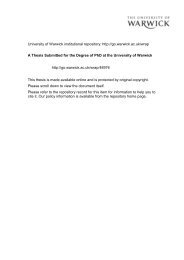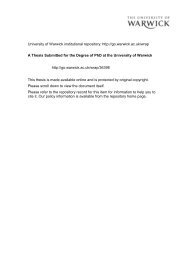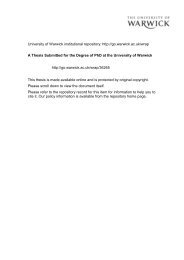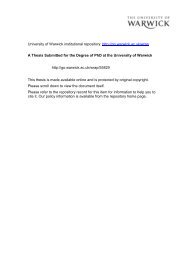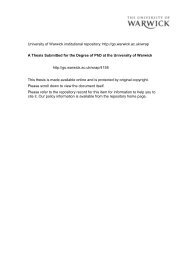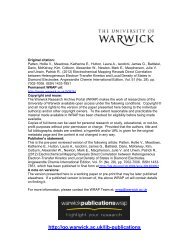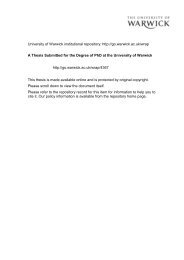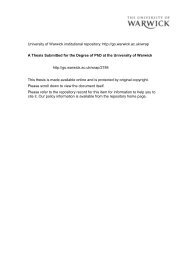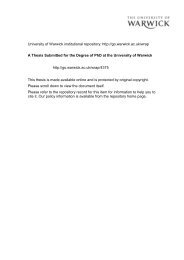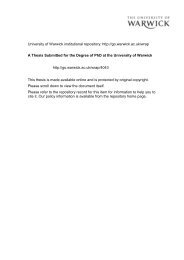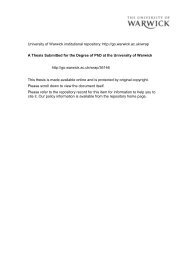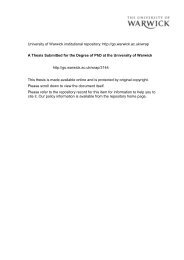Download (13Mb) - WRAP: Warwick Research Archive Portal ...
Download (13Mb) - WRAP: Warwick Research Archive Portal ...
Download (13Mb) - WRAP: Warwick Research Archive Portal ...
Create successful ePaper yourself
Turn your PDF publications into a flip-book with our unique Google optimized e-Paper software.
trend towards genre-mixing and genre-breakdown.III<br />
McLoughlin argues that such a tendency is a contemporary one in what he describes<br />
as 'negative non-dualist: postmodernist' giving as Italian examples Calvino, Benni,<br />
Capriolo and Manfredi in which:<br />
real and unreal do not combine to create a surreality but they cancel each other<br />
out; the transcendent in this case is neither real nor unreal (nor a combination of<br />
the two). By refusing to represent anything beyond itself the text calls attention<br />
to its own artifice wherein lies the transcendent dimension that the text tries to<br />
express. The reader is required to experience the transcendent aesthetically<br />
rather than (as in the dualistic and positive non-dualistic forms) to know it<br />
conceptually. Extratextual representation is replaced by intertextual reference<br />
and the fantastic concept is reduced to the status of metaphor, which is in all<br />
three cases, undermined; the transcendent dimension that the postmodem<br />
fantastic tries to express can only be pointed to - even the fantastic concept is<br />
inadequate to describe it.112<br />
Before getting lost in a labyrinth of potentially sterile postmodern game<br />
playing it is worth considering the proximity ofthat double pull which is still present<br />
in the fantastic genre, between the reader's involvement and distance, to Linda<br />
Hutcheon's definition of the 'central paradox' of 'textually self-conscious<br />
metafiction' :<br />
that, while being made aware ofthe linguistic and fictive nature ofwhat is being<br />
read, and thereby distanced from any unself-conscious identification on the<br />
level of character or plot, readers of metafiction are at the same time made<br />
mindful of their active role in reading, in participating in making the text<br />
l 13<br />
mean.<br />
Much of the contemporary fantastic studied in this thesis shares this emphasis on the<br />
reader's role in connecting the text, however tentatively, to a new vision ofthe real. It<br />
makes the space of the text one of negotiation between author, reader and the<br />
definition of literature itself. Women writers have far more to lose and gain in this<br />
process - their writing is not merely able to point towards an unattainable<br />
'transcendent dimension'. For women, who have first hand experience of the<br />
interdependence of their textual and 'real' objectification, infinitesimal shifts in<br />
III Neil Cornwell, p.143.<br />
112 Michael McLoughlin, in his conclusion.<br />
113 Linda Hutcheon, Narcissistic Narrative: The Metcflctional Paradox (New York: Methuen, 1984),<br />
p.xii of Preface.<br />
39




